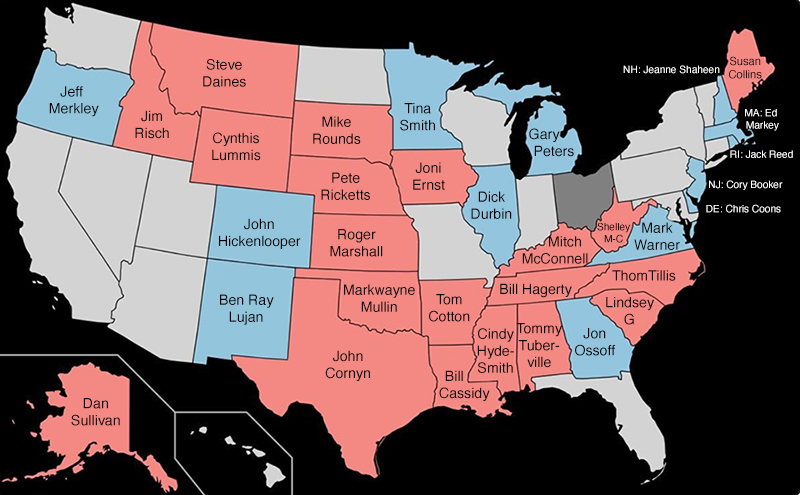

The 2026 elections are practically upon us. Only 2 years to go. Taking the item above about the longevity of trifectas to heart, the Democrats absolutely have a chance to win back the House because every seat is up. The Senate is an elephant of a different color. After all, only a third of it is up, and it matters very much which third. Here is the preliminary 2026 Senate map showing who is up for reelection in each state (the gray states do not have a senate election in 2026):

Although the map is not as bad for the Democrats as the 2024 map (which had three Democrats in deep red states), it still isn't good. For nearly all the races, we can already predict with 90% certainty which party will win, although there could be a few retirements. The Democrats' best pickup opportunities are Maine, where Sen. Susan Collins (R-ME) has to fight for reelection in a blue state, and North Carolina, where Sen. Thom Tillis (R-NC) could be vulnerable if Gov. Roy Cooper (D-NC), who will soon be private citizen Roy Cooper, with plenty of spare time on his hands, challenges him. The Democrats are going to pull out all the stops to get Cooper to run. Cooper is 67, but he is a team player and in Senate years, 67 makes him middle-aged, not old. After all, Sen.-elect Jim Justice (R-WV) is about to begin his Senate career, and he's 6 years (a.k.a. one Senate term) older than Cooper.
One seat that the Democrats are going to sweat bullets over is Georgia, where Sen. Jon Ossoff (D-GA) is on the ballot without the help of Sen. Raphael Warnock (D-GA) to get Black voters to the polls. The Republicans are going to do everything they can to get outgoing Gov. Brian Kemp (R-GA) to run. However, he is almost certainly gunning for a run at the White House in 2028 and has to decide if first going for the Senate will help him. If he runs for the Senate and loses, he will be marked as a loser in his own state, which will make a presidential run more difficult. Ossoff is an incumbent, and 90% of incumbents win, so Kemp has to make a difficult decision.
There is a similar dynamic at play in Kentucky. Sen. Mitch McConnell (R-KY) will be 84 in 2026 and he has health problems. He will very likely retire. This will leave an open seat for Gov. Andy Beshear (D-KY) to try for. He also has presidential aspirations and has to make the same decision as Kemp, but with the advantage of an open seat and the disadvantage of running in a deep red state. For him, we think he is likely to run for the Senate. After all, if he can win statewide for the fourth time (attorney general, 2x governor, Senate), he will have a very strong claim in 2028 to saying "I'm the second coming of Bill Clinton. I can win in red states." He is a moderate, but Democrats are so hungry to win and so scared of J.D. Vance, the progressives are likely to take ability to win a general election into consideration, even with Gov. Gavin Newsom (D-CA) almost certainly in the mix. Newsom's problem will be convincing Democrats he can actually win after another San Francisco liberal, Kamala Harris, didn't. Of course, Newsom is a white guy.
None of the other states look competitive. None of the other Senate candidates are ancient, so we are not likely to get many retirements and thus open seats, which are easier to flip. (V)